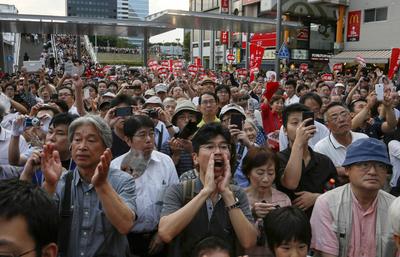In contrast, over the same time period, Western interest in China has shot up with seemingly no end in sight. But we must ask ourselves, is the competition only about economic statistics and GDP? Japan can offer the world something equally valuable which China cannot yet do — freedom in the media, scholarship and political debate.
While studying in China can offer tremendous benefits, such a pursuit provides returns essentially limited to subjects directly connected to China. The Chinese scholarly market focuses mainly on itself because it remains censored and essentially state-managed — it continues to suffer from political bias. On the other hand, Japanese scholarship is a major source of information about the world. It translates virtually twice the number of books that China does, yet its population is almost one-tenth of China’s. Japan both contributes to and draws from international education in a way that the current system in China does not. With these educational resources, Japan has the potential to serve as a channel for interests other than those of the West (or China) in East Asia. This is especially the case now, as the region faces new challenges far different from those encountered when American dominance was established in the early Cold War.
The problems with the Chinese education system can be demonstrated by the issues that academic Sergey Radchenko faced when he tried to introduce Western critical scholarship on China to his students at a British university campus in China. Radchenko encountered a wall when Chinese authorities refused his selections of English books in his courses. In his words, Chinese students will only partially take in critical information because ‘What they do know tends to agree with government-sponsored discourse on the pride and glory of China’s rise after a century of humiliation by Western powers’.
Critics of the Japanese education system have also accused it of closed-mindedness. But its problems pale in light of the fact that Japan is an open democracy — all can freely publish, and the content of university courses are not state mandated. So, in recent years, many Chinese scholars have published their work in Japan when it failed to obtain approval in China.
While in China historical debate remains anathema to the state, Japan is a society that allows for dispute and disagreement with the government. This is vitally important in the region, a fact that often gets overlooked in the West’s zeal to prosper from Chinese economic growth. Japan has much to offer Asia and the world in media and scholarship because Japanese scholars are closer to and often in much more frequent contact with what is going on in East Asia. The writer and academic Katô Yoshikazu is indicative of what Japan has to offer. He is part of a new breed of young Japanese who graduated from an elite Chinese university and writes in measured tones for the media in both countries in both languages.
While his story also demonstrates the deep changes in China that have allowed a Japanese to study and work there, the ability to freely pursue all topics in China remains an issue. For example, the Chinese Ministry of Foreign Affairs Archives was recently closed again, supposedly for reorganisation but probably because a Japanese journalist uncovered an official document that undermined the Chinese position on its island disputes with Japan. A similar event happened in Japan some 20 years ago, when academic Yoshimi Yoshiaki exposed some documents relating to the history of comfort women. But Yoshiaki’s subsequent book on that topic changed the Japanese government’s stance on comfort women and, in some ways, forced Japanese society to revise some long-standing incorrect views.
Although Japan does not celebrate a culture of debate comparable to that in countries like the United Kingdom (where parliamentarians must defend themselves in Question Time and in the media), another example of how Japan fosters political discussion is shown by the publically available online Diet Minutes — something unthinkable in China and an example of just how far Japan has evolved since its imperial downfall.
Today, Japan, with its vibrant media and measure of political debate, can play a crucial role in East Asia — and this should not be overshadowed by, or dismissed because of, the rise of China. Japanese society is also capable of achieving more. Leveraging Japan’s open institutions can produce more impetus towards fulfilling Japan’s potential and encouraging discussion of the important issues. East Asia needs Japan, and more than just for its economic purchasing power.
Barak Kushner is Senior Lecturer in Modern Japanese History in the Faculty of Asian and Middle Eastern Studies, University of Cambridge.
This article appeared in the most recent edition of the East Asia Forum Quarterly, ‘Coming to terms with Asia’.


Good piece. While Japan’s “culture of debate” may not be as lively as it should be–I think particularly of the very cliche-ridden and uninformed comment on macroeconomic policy these days–in fact parliamentarians are often called to account on TV talk shows. What is totally different from the US is that they actually talk like human beings and are questioned at length by other panelists. Of course it isn’t like UK where BBC interviewers do their best to beat up whoever they are talking to.